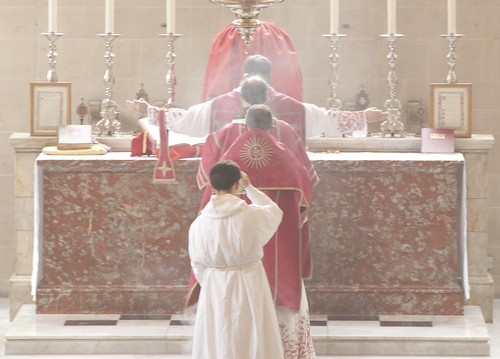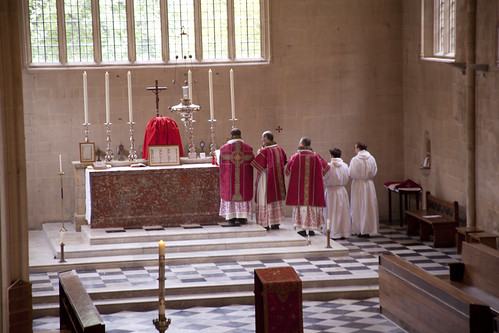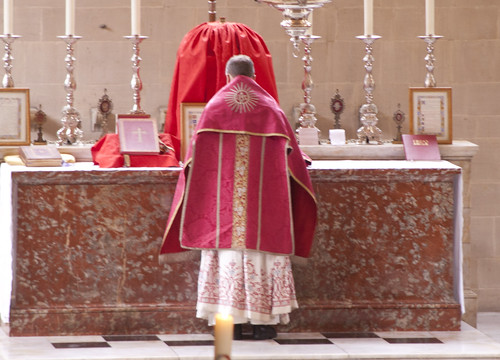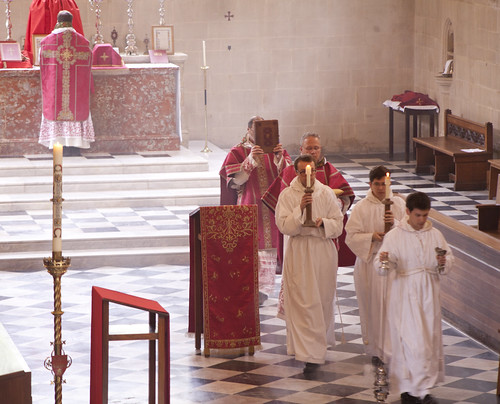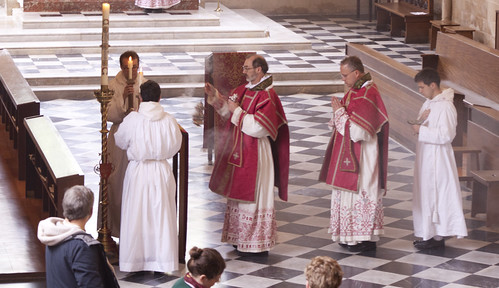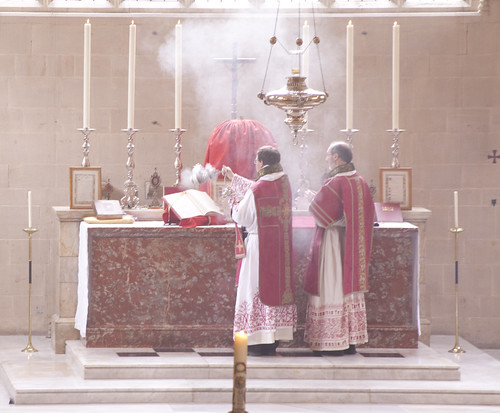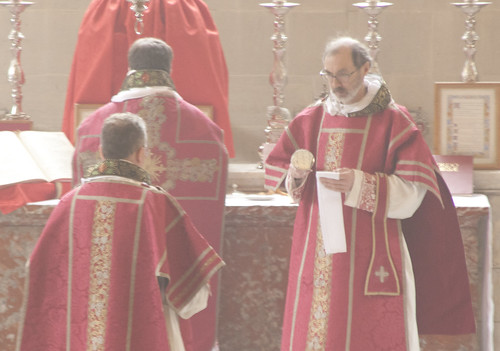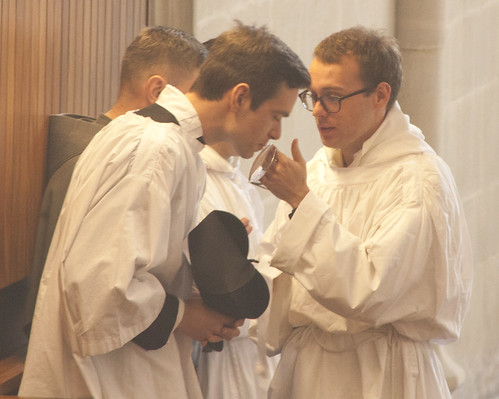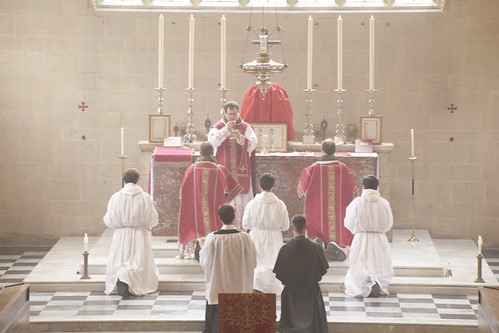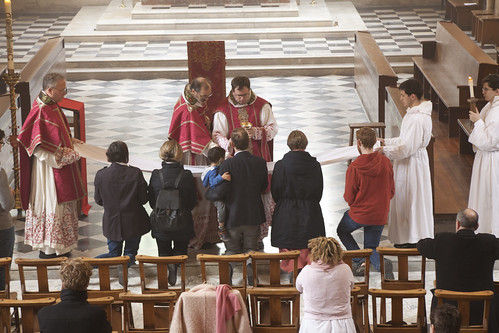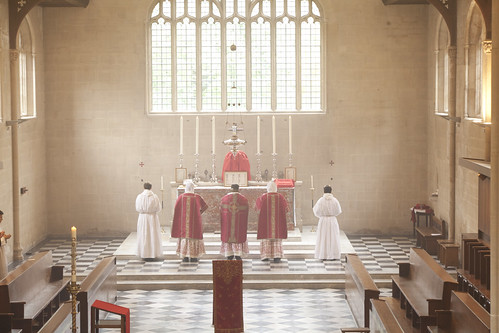Chairman's Blog
Dominican High Mass for St Peter Martyr: photos
Last Saturday Oxford's Dominicans celebrated a High Mass; it was the feast of St Peter Martyr in the Dominican calendar.
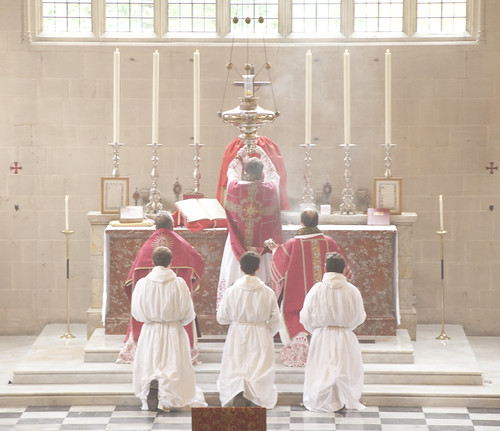
As Mass progresses, the incense increasingly clouds my photos of the sanctuary, taken from the choir loft.
Support the work of the LMS by becoming an 'Anniversary Supporter'.
Novel: The Devil Hates Latin
 I've just read a new novel, a first novel, with a Catholic theme: 'The Devil Hates Latin' by Katharine Galgano. It is being published by Regina Magazine. It is really more of a thriller than anything else, involving both the corruption and the graces which characterise the Church of today, and of all ages.
I've just read a new novel, a first novel, with a Catholic theme: 'The Devil Hates Latin' by Katharine Galgano. It is being published by Regina Magazine. It is really more of a thriller than anything else, involving both the corruption and the graces which characterise the Church of today, and of all ages.
You can buy it here (UK) and here (USA).
Something we need to try to keep hold of today is the interplay in the Church, and in the world as a whole, of really terrible bad things, and the action of God. I think Catholics can handle this better than Protestants, as long as we manage to escape the historically Protestant idea that the Church is or should be the community only of the saved. Of course the Church contains sinners, chancers, the ambitious and the corrupt, and some of these will attach themselves to positions of prestige in the Church because they like the idea of the prestige and the money and influence that it might bring. The Church also contains the lukewarm, and people who have made all sorts of compromises without ever saying to themselves that they no longer believe.
Into this endlessly complicated situation the Devil seeks to bring souls to Hell, and God works his grace, especially through the sacraments. It is a battle fought by all of us, day by day, Mass by Mass, confession by confession, temptation by temptation. Galgano presents this in a highly dramatised form, which is hugely fun to read, but also also says something fundamentally true about the fallen human condition, with some pithy insights into culture, politics, and the Church.
You can buy it here (UK) and here (USA).
Support the work of the LMS by becoming an 'Anniversary Supporter'.
New Book: 'Gradual' by Berkely and Scotland
| From the Moretus Gradual, 1598 |
I've just purchased a read an intriguing, short book on the restoration of rare, late-16th century printed Gradual: a collection of chants for the Church's liturgical year. The Gradual in question was beautifully printed in the Spanish Netherlands, using hand-copied monastic chant books as its sources.
The chant notation (shown, left) looks very like that used in the editions most singers use today, though it used five staves and lacks some of the specialised note-shapes (singers will note that there don't seem to be any quilismas or liquescents). Again, it (obviously) doesn't include the editorial marks added by the monks of Solesmes to most modern editions.
Although the melodies are somewhat different from the ones used today, which have been restored by reference to the oldest available manuscripts, they are quite different from the simplified and clunkily-printed chant used immediately before the Solesmes-influenced 1907 Graduale Romanum, upon which later editions have been based, exemplified by the 1870 Pustet edition shown below.
 |
| From the Pustet Graduale of 1870 |
The story of the restoration is fascinating, as it the discussion of the place the Gradual had in the
Counter Reformation programme of restoration in the Spanish Netherlands.
The book, Gradual by Julian Berkely and Tony Scotland, is available, with a pre-publication discount, at £13 from Shelf Lives (inc UK p & p) up to Mon 15th May; thereafter it will be bookshops, including John Sandoe in London, at £15, or from Amazon at £16 (inc UK p & p).
 |
| From the 1961 Graduale Romanum |
The book's blurb:
An illustrated monograph about the rescue, restoration and history of a monumental book of early printed Gregorian Chant, and its continuing use in the revival of the traditional Latin liturgy. The Gradual of the title, containing the chants of the Mass, was published by the great Renaissance printer, Jan Moretus, at the Plantin Press in Antwerp in 1598. This was the supreme achievement of a new technology supplanting the art of illuminated manuscripts – and an act of defiance by a Church besieged by the Protestant forces of the Reformation.  While the Dutch War of Independence raged around Antwerp, the Plantin Press spared no expense in creating this important and infl uential work, sending copies throughout the Catholic world to keep the Divine Office alive, and to raise the spirits of the recusant faithful. Among these were the aristocratic English women who fled Elizabeth’s persecutions for the relative safety of the Spanish Netherlands, and founded a Benedictine convent in Brussels, under the abbacy of Dame Joanna Berkeley. The ancient Chants which the Brussels Dames sang from their Moretus Gradual more than four hundred years ago had already survived a millennium – and are drawing a new generation of young people today.
While the Dutch War of Independence raged around Antwerp, the Plantin Press spared no expense in creating this important and infl uential work, sending copies throughout the Catholic world to keep the Divine Office alive, and to raise the spirits of the recusant faithful. Among these were the aristocratic English women who fled Elizabeth’s persecutions for the relative safety of the Spanish Netherlands, and founded a Benedictine convent in Brussels, under the abbacy of Dame Joanna Berkeley. The ancient Chants which the Brussels Dames sang from their Moretus Gradual more than four hundred years ago had already survived a millennium – and are drawing a new generation of young people today.
Support the work of the LMS by becoming an 'Anniversary Supporter'.
Colloquium on Limbo in Ramsgate, 30th June-1st July
 |
| Dante visiting the First Circle of Hell: limbo, where the souls of good pagans, like the ancient philosophers, enjoy a state of peace and natural happiness. |
DR LAWRENCE FEINGOLD; FR ANDREW PINSENT; DR JOHN A. DEMETRACOPOULOS; FR JOHANNES MARIA SCHWARZ; DR ALYSSA PITSTICK
Theme:
The doctrine of Limbo has been a subject of controversy for nearly seventy years. What is the state of those who depart this life with original sin only? Is it possible to maintain that no souls do depart this life in such a way? Intimately tied to the question of the 'natural desire for God' and to the dispute over the necessity of faith in Christ for salvation, Limbo occupies a strategically vital position in the theological landscape.
New on the Order of Malta
 |
| Image h-t Andrew Cusack |
The election of a new Grand Master of the Order of Malta in Rome on Saturday - tomorrow - has precipitated an avalanche of news stories, many containing intriguing claims about the root causes of the shock resignation of the last Grand Master, Fra Matthew Festing.
The most interesting aspect, which has been revealed already in part by past postings by Steve Skojek at One Peter Five, is the role of money in the saga of the Knights. The claim is that because Order was a beneficiary of a shadowy trust based in Switzerland, the attempts by Fra Matthew Festing to get to the bottom of this trust and ensure that the law was followed threatened to precipitate revelations which would be embarassing to people in positions of considerable influence in the Vatican. Festing had to be removed in order to remove this threat. The interim leadership of the Order has, at any rate, rapidly come to an amicable agreement with the trustees of this trust and we may now hear no more about it.
Pope Francis' alleged role in this reminds me very much of the role of Pope Benedict and Pope John Paul II in various Vatican scandals: that of trying to keep a lid on a situation which he cannot ultimately control. Pope Benedict was, frankly, defeated by the problems at the Vatican bank, and Pope John Paul by the clerical abuse problem. I don't think any of these popes were personally implicated in wrongdoing. What none of them allowed, however, was a big melt-down involving the public disgrace of senior officials and the publication of a lot of embarassing information. Such a thing is almost unthinkable in the Vatican, but it may in fact be the only thing which would actually resolve the problem,
Here is a selection of news stories:
One Peter Five: Fr Matthew Festing has decided to go to Rome for the election despites attempts to stop him
Church Militant: several strands about the current situation and its causes
Lifesite News: members of the Order petition Pope Francis for an explanation of his unprecedented intervention in the Order
Edward Pentin in Catholic Register: Vatican allows Festing to attend the election after all
Mass in a bottle
This is so wonderful that I want to share it. From Twitter, hat-tip to Dr Francis Young (website):
@SuffolkRecusant
I don't, unfortunately, have any other information about this image.
Support the work of the LMS by becoming an 'Anniversary Supporter'.
Dominican High Mass this Saturday in Oxford
Support the work of the LMS by becoming an 'Anniversary Supporter'.
York Pilgrimage: Sat 29th April
Support the work of the LMS by becoming an 'Anniversary Supporter'.
Hamish Fraser on making the Faith visible
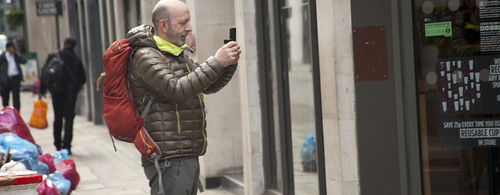 |
| A passer-by taking a photo of the procession with the Easter Candle at the Easter Vigil in St Mary Moorfields. |
I've been reading Hamish Fraser's Fatal Star, part biography and part commentary on the Church of his day. It was published in 1952, Fraser having been received into the Church some seven years earlier, after an extended period as a Communist activist: including in the Communist secret police in the Spanish Civil War. The edition I have includes extracts from his writings up to the 1980s.
Fraser became a greater supporter of the Traditional Mass, but this isn't the focus of this book. Instead, he connects the Presbyterian culture of his childhood with the untrammelled capitalism which made Communism attractive, laments the failure of the Church to offer an alternative, and points to the message of Fatima as a call to do just this, not (simply) through private devotions, but through penance and conversion of life. He quotes Sister Lucy as saying that the primary message of Fatima is not the Rosary or the First Saturdays, but Penance, and the duties of one's state of life.
His experience of Catholics in industrial Glasgow between the wars was that they offered a watered-down Marxism as a response to the social ills of the Great Depression. After the Second Vatican Council, this was even more the case, and in the case of Liberation Theology, not much watering down was being done. In the meantime, Fraser had discovered the Church's social teaching (Leo XIII and his successors), when researching for a prize essay, and was bowled over by it. He thought it would be fun to win a prize essay on the subject of religion as an atheist, but was no longer an atheist by the time he received it. God has a sense of humour.
Why, he asks, was no one in the Church talking about this social teaching? Or so few that it never percolated down to ordinary Catholics in the trade union movement. Leo XIII framed his teaching precisely as a counter to the rise of anti-clerical Socialism, but it was simply never incorporated into the Church's everyday teaching and practice.
There is a good deal to be said about this historical question, but it also raises a broader practical question for today. People are not going to benefit from what Christ has given the Church to help them be saved if they do not hear anything, or anything positive, about the Church. Most people do not hear Catholics talk about the Faith, and they do not see the Faith manifested in any other way either.
One would never know, from Fraser's complaints about the Church of the 1930s and 1940s, that this was a high point of Catholic evangelisation. It doesn't mean he was wrong: perhaps the Church could and should have been doing even better. But compared to today the Church was visible. Catholic colleagues at work could be identified in all sorts of ways, such as their eating fish on Fridays, which would be impossible today. They were not just identifiable as Catholics by such symbolic actions, however, they had noticeably different attitudes. In the society depicted by the novels of Graham Greene, Evelyn Waugh, and others of that generation, being a Catholic meant that you'd have noticeably different attitudes to a range of ethical issues, including sex outside marriage, abortion, and euthanasia. It wasn't that Catholics were all saints, but their Faith made a difference to way they thought even if they were sinners.
To manifest one's religion in this kind of way today is to set oneself apart not only from non-Catholic society, but from the majority of one's fellow Catholics. Most self-identified Catholics do not attend Mass, nor do they have particularly strong or distinctive views about divorce or contraception. Fraser thought that the Faith was invisible in 1950; today you need a microscope to detect it. When an individual Catholic does do or say something reflective of the Faith, far from being representative of the Catholic community, it is nominal Catholics who will be among those most eager to shout him down. Outsiders don't always have any reason to think that an orthodox Catholic is more characteristic of the Faith than an unorthodox one. Converting to the Faith must seem a little like joining a debating society, perhaps with a view to supporting the less popular side.
It is not easy to know how to handle this situation. What I would at least suggest is that we still need, indeed need more than ever, Catholics in the workplace, in academia, and in the media, who are identifiable as such; we need all kinds of good works to be identifiable as Catholic; and we need ideas identifiable as Catholic in debates about all manner of public and private matters.
Perhaps this is obvious, but there are many who do not behave as though it were true. While I criticise no one who needs to keep the Faith under the radar for personal reasons in the workplace--only they can make that judgement--others make a virtue of it, claiming that they can do more good by being invisible. I'm sorry, but this is wrong. You may have some good influence, but if you succeed in hiding the fact that this influence has any connection with the Catholic Faith, you have also done harm, by creating the dangerous illusion that the wholesome moral instincts and the energy to implement them can as easily spring out of a purely secular source as from grace.
Again, many Catholics can't see a Catholic organisation doing some good work or other without wanting to make it more 'inclusive', either of other Faiths, or of secularists, making it either officially ecumenical or Catholic only in its 'heritage'. Again, this is a way of pretending that good works springing from a living Faith are just humanistic impulses. It is not evangelisation, but a counter-evangelisation.
I don't see the situation for evangelisation in this country as entirely hopeless. If you know where to look, you can find a great many Catholics, deeply indebted to the Faith, serving their fellow citizens in all sorts of ways, which should be making the Faith visible. There is a problem, however, that so many of them are deliberatly trying to keep their Faith under wraps.
To repeat, I don't blame anyone for keeping quiet when colleagues mention the explosive issues of the day, in order to preserve the ability to earn a living for their family. What I am blaming is the attitude that a self-confessedly Catholic organisation, initiative, or idea is ipso facto an embarrassment. If you are embarrassed of Christ, ultimately, he will be embarrassed of you.
For he that shall be ashamed of me, and of my words, in this adulterous and sinful generation: the Son of man also will be ashamed of him, when he shall come in the glory of his Father with the holy angels. (Mark 8:38)
Support the work of the LMS by becoming an 'Anniversary Supporter'.
Children misbehaving in Mass: and an interview in Regina Magazine
I recently completed an interview with Anna-Maria Vesey of Regina Magazine on children at Mass. She said, what I am sure is true, that some parents with small children are concerned that their children won't be engaged at the Traditional Mass, or else that their behaviour won't come up to the expectations of the regulars, and that such thoughts put them off trying it out.
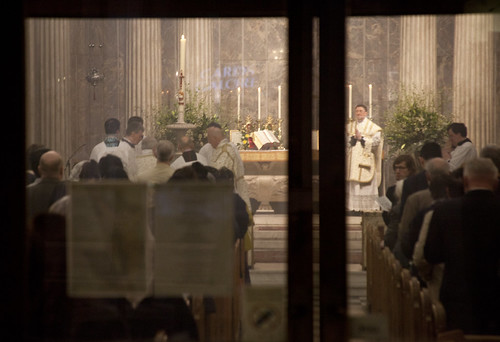 |
| Watching (part of) the Easter Vigil two sets of closed doors away from the action... |
It is impossible to guarantee no one at the Traditional Mass will tick off parents of small children, but I can say this to reassure parents:
There is such a thing as hostility to families and children in some churches, but this is much more common at the Ordinary Form than it is at the Traditional Mass, where there is a noticeably higher proportion of children present. This is partly because of larger families, and partly because the Traditional Mass is sought out by young parents. The sour looks and tut-tutting one gets as a parent trying to manage small children at Mass generally come from people, usually lay people but occasionally priests, who aren’t used to seeing children at Mass. People who go regularly to the TLM are that much more likely to be used to them.
You can read the whole interview here.
Here I want to say more about people ticking off parents at Mass. I've been ticked off a few times, sometimes for the behaviour not of my own but of other people's children. Inside a church at the end of Mass is not the best time and place for a discussion, still less a heated argument, and it is hard to know what to say in response.
I think a good quick rejoinder would be to direct the annoyed person to the celebrant or parish priest. It is for the priest in charge to determine what behaviour is intolerable, and it is legitimate for people unhappy with things happening in church to take their concerns to him. It is the priest who has the authority to ask parents to try a different approach to dealing with their children in Mass, if this really is necessary. He is also in a better position than a parent (or bystander) suddenly confronted with a complaint at the end of Mass (or, still worse, in the middle of it) to have a rational discussion about it.
Other things I'd like to say to those complaining about children in Mass, if it were possible to engage them in extended discussion, would be these.
Have you had the experience of bringing small children to church yourself?
Complaints seem almost invariably to come from people who have no such experience. Parents aren't perfect - we are sinners like the rest of you - but with experience comes an understanding of what strategies parents have been using or could use, why things might be difficult on a particular occasion, and so on.
Did you move from your pew near the children to somewhere further away?
Astonishingly, people complaining about children rarely seem to think of doing this. They expect parents to go to all sorts of lengths, including not coming to church at all, before it occurs to them to walk ten yards to a quieter part of the church.
Have you noticed the efforts parents are making to keep their children quiet in Mass?
The complaints of Mass-goers about one's children are particularly hard to bear when one has been standing up holding a small child, to keep him quiet, for forty minutes at a stretch, or when one has spend more than half of Mass outside with one. Sympathy for others' complaints can be directly correlated with their gratitude for one's own efforts.
Do you think that parents of small children should attend Mass?
What complainants tend not to appreciate is that if the children aren't there, their parents won't be there either, because it is generally impossible for the parents to attend without the children. This will be particularly so at the Traditional Mass, where you can't pick and choose between lots of Mass times. Another aspect is, of course, that the experience of people being extremely rude to them is likely to put many parents of small children off attending your particular church, and perhaps any church, under any circumstances. Either way, you are driving whole families away from Mass. Does anyone think that that is a good idea?
Do you think that small children themselves should attend Mass?
The subtext of at least some complaints about children is that small children should not be there at all. Indeed, hard-core tut-tutters often object not simply to children making a noise in church during Mass, but to small children playing quietly outside the back of the church, under parental supervision, when this has proved necessary. This may sound incredible, but I have experienced it with my own family more than once.
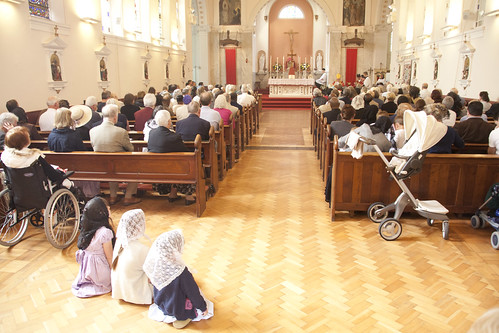 |
| LMS Pilgrimage in honour of St Winefride, Holywell |
It is true of course that small children are not under the same obligation to attend Mass as older children and adults, and it is also true that for certain classes, at certain times and places in the history of the Church, it was common to leave children at home with domestic servants while the adults went to church. (Again, in many historical and cultural contexts mothers have not been expected to leave home for a long time after childbirth.)
However, the attitude of Jesus Christ is emphatic: do not hinder little ones (pavuli in Mark; infantes in Luke) in coming to him (Mark 10:13-16). Again, he did not simply permit, but actually defended the role of children (pueri) in singing at his entry into Jerusalem (Matthew 21:15-16). The High Priests thought they were making too much noise...
Something which surprised me in researching for the FIUV Position Paper on Children were the Old Testament passages demanding the presence small children at liturgical events. For example:
What would actually help? The single thing which would make the biggest difference for children attending any service is the timing. Masses scheduled when small children would normally be eating or sleeping are, for reasons which I need not labour, going to be a lot more difficult for them than other times. We can all appreciate the difficulty of squeezing the Extraordinary Form into an already crowded church timetable, but given the fact that parents with small children will want to attend it, some consideration should be given to this reality. The support of all parishioners in bringing the Traditional Mass in from the margins, and from the least child-friendly time slots, would make a far more positive impact than all the tut-tutting in the world.
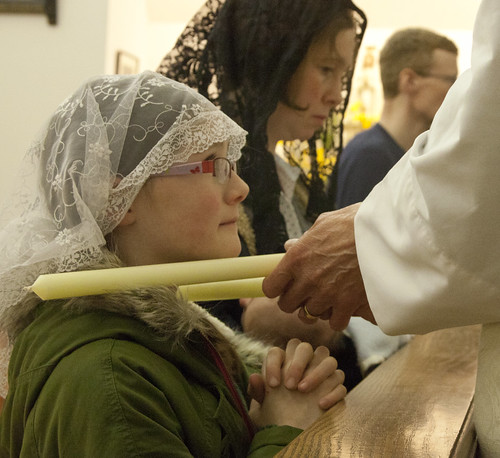 |
| Blessing of throats for the Feast of St Blaise. |
Related: commentary on the FIUV paper on Children and the Extraordinary Form (with a link to the paper);
on Geoffrey Hull on children at Mass.
Support the work of the LMS by becoming an 'Anniversary Supporter'.

